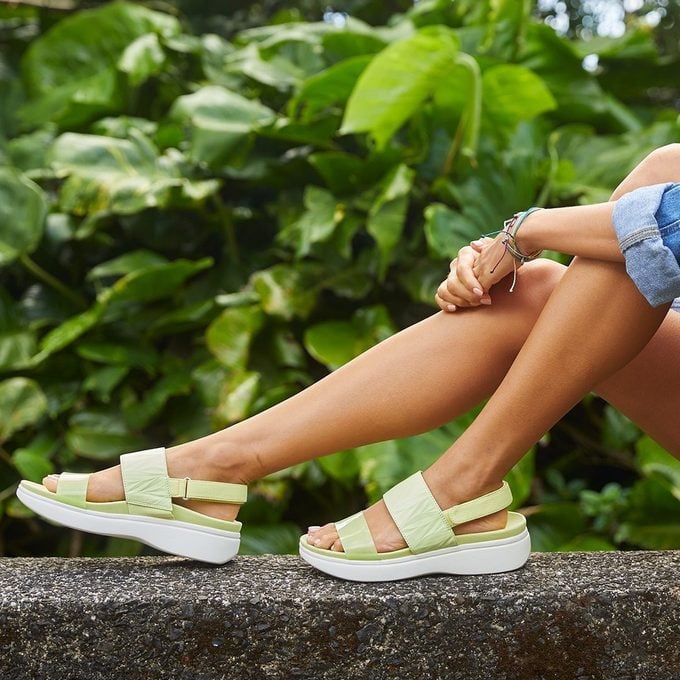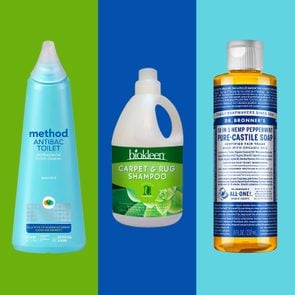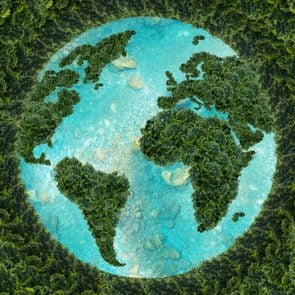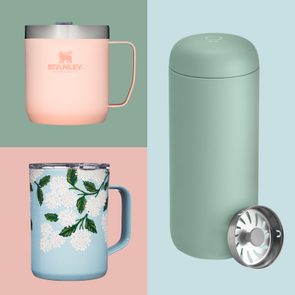17 Eco-Friendly Brands You Can Support Right Now
Updated: Apr. 15, 2024
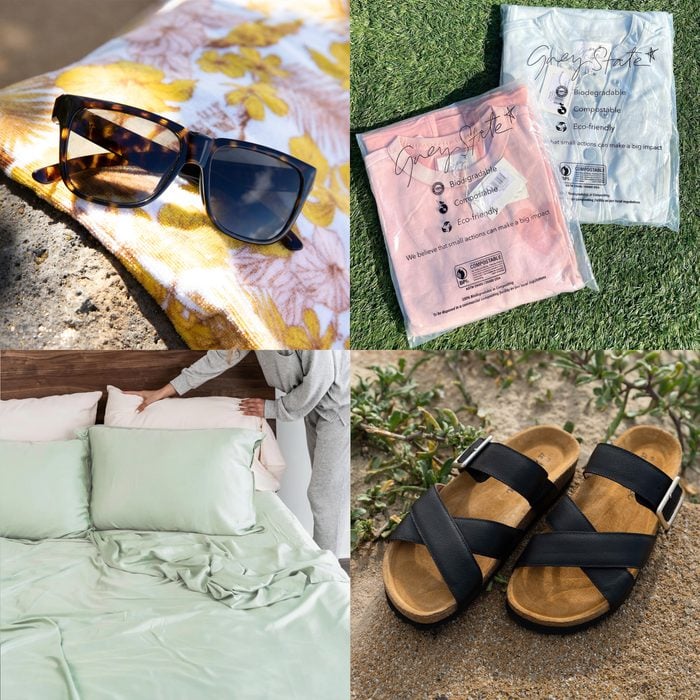
Ease in to going green by shopping these sustainable brands
Our editors and experts handpick every product we feature. We may earn a commission from your purchases.
We all know that eco-friendly products are better for the planet. We’re also well aware that it’s a good idea to support sustainable brands. With greater awareness of climate change and the way our increased consumption contributes to greater greenhouse gas emissions and pollution, we also know it’s smarter to recycle and move toward overall sustainability.
But what exactly does all of that mean? If you’re in the grip of climate anxiety but have no idea where to begin on your journey to sustainable living, don’t panic. There are small steps you can take to live a greener life. You can shop for the best sustainable fashion instead of environment-harming fast fashion. You can sip from reusable straws instead of plastic, from eco-friendly water bottles instead of plastic bottles that just end up in landfills. And you can ditch those plastic grocery bags, opting for a reusable tote instead.
What does it mean for companies to be “eco-friendly”?
Simply put, “eco-friendly” means a product or company isn’t harming the environment. Sustainable brands tend to keep an eye on their carbon footprint and take steps to conserve water, energy and other natural resources. Often these brands produce reusable products, cutting down on the environmental damage done by quick-use items that end up in the trash (and landfills).
Why is it important for companies to be eco-friendly?
“Eco-friendly companies have a focus on how their products—from manufacturing and distribution to use and lifecycle—impact the environment,” says Craig Dubitsky, founder of eco-friendly oral care brand Hello Products. “Eco-friendly companies strive to make sure their offerings benefit the people who use them while minimizing potentially negative effects the products may have on our environment.”
That’s important because we only have one earth, and with climate change a very real issue, we need to do our part to make sure it’s inhabitable for future generations.
What is greenwashing?
“Greenwashing is claiming you are doing good things for the planet when, at best, it’s not a reality and, at worst, [it’s] an outright lie,” says Steven Sashen, CEO of Xero Shoes.
Unfortunately, far too many companies claim to do good when they aren’t. Take, for instance, some so-called sustainable clothing brands. Despite their claims, the clothing and textile waste can still end up burned or buried in landfills. “That’s why companies should be honest about their environmental impact and tell our green story only when it’s genuine,” Sashen says.
Why should I care if a company is sustainable?
“When companies and consumers take responsibility for their products and their carbon footprint, the planet will be in a much better place,” says Matt Bertulli, CEO of Pela, which makes sustainable accessories.
The way he sees it, sustainability affects everyone. “Every product designed and manufactured generates carbon emissions and waste,” he says. “And the truth is, there is no Planet B.”
How do you identify eco-friendly brands?
“We hate to stereotype, but many companies that produce cruelty-free products [meaning those made without animal testing] also tend to care a lot about environmental issues,” Dubitsky says. You’ll start to become familiar with logos that represent specific certifications or offer useful information about how eco-friendly a product is.
When shopping for sustainable products, look for these on the label:
- Leaping Bunny. Often found on cosmetic or personal care products to indicate they’re cruelty-free, this certification is a good marker of a company that may be taking steps to lessen its impact on the environment.
- How2Recycle. This label shares specific information on whether or not a product is recyclable.
- FSC. The Forest Stewardship Council certification “indicates that best practices around forest conservancy are being employed and that additional trees were not destroyed to make the box a product might come in,” according to Dubitsky.
- B Corp. This certification indicates that a company agrees to be fully transparent and is known to have high social and environmental performance. That might mean the company doesn’t waste energy or use fossil fuels in the production process, and that it tries not to increase greenhouse gas.
- 1% for the Planet. Companies with this certification give 1% of annual sales to environmental causes.
- Climate Neutral. Brands with this certification must meet certain standards when it comes to measuring greenhouse gas emissions, offsetting carbon emissions and taking steps to reduce emissions.
If you’d like to get serious about researching eco-friendly products before you buy, you can use the browser extension Finch, which rates products for sustainability. “We like certifications like B Corporation, Rainforest Alliance or FSC certified,” says Finch founder and CEO Lizzie Horvitz. Beyond certifications, the extension considers companies’ transparency, climate footprint, water use and waste created, plus products’ toxicity to humans.
Dubitsky also suggests looking for information “about percentages of virgin versus recycled materials in your products.” His brand, for instance, uses 100% post-consumer recycled material in its deodorant packaging, which means the container was something else entirely beforehand. Plenty of sustainable brands give new life to things like recycled ocean plastic.
The best sustainable brands
Now that you know why it’s so important to support eco-friendly brands, it’s time to start shopping from the companies that put their money where their environmental ethics are.
In no particular order, these are some of our favorite sustainable brands of 2022. They may not be the biggest sustainable brands out there, but each has a product or ethos that sets it apart from the rest.
Best for hair care

HiBar
If you’re tired of the whole lather/rinse/repeat life, you might want to try a new type of shampoo. HiBar makes plastic-free, salon-quality shampoo and conditioner bars and has just introduced the world’s first amino acid face wash bar. Waterless bars and plastic-free packaging and shipping? Sounds like a green-living win.
Pros:
- No soap, parabens, sulfates, phthalates, fragrances, artificial dyes or mineral oils
- Cruelty-free, vegan and made in the United States
- HiBar has eliminated more than 3 million bottles from waterways and landfills since 2019 and saved more than 700,000 gallons of water by creating water-free products
Cons:
- The shape of each bar is a bit awkward
- Users need to stand up the bar to let it dry after each use
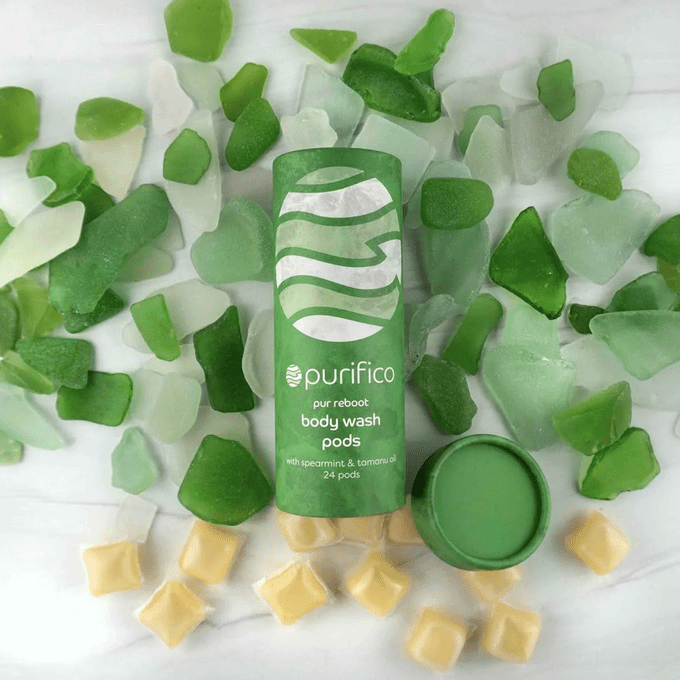
Best for body wash
Purifico has solved three problems at once with its innovative Body Wash Pods: 1. The products are concentrated so they uses less water; (that not only saves one of earth’s precious resources, but it also cuts down on greenhouse gases from shipping). 2. The packaging is recycled cardboard, not the traditional plastic. 3. The entire pod is the product, which makes it easy to use every last drop so none goes to waste. As for the body wash itself, well, the moisturizing formula has a light spearmint scent thanks to ingredients that are 98% naturally derived.
Pros:
- 1% for the Planet certified
- Leaping Bunny certified
- Free of paragons, phthalates, sulfates and silicone
- Travel-friendly
Cons:
- Body wash is only available in one scent.
Best for milk alternatives
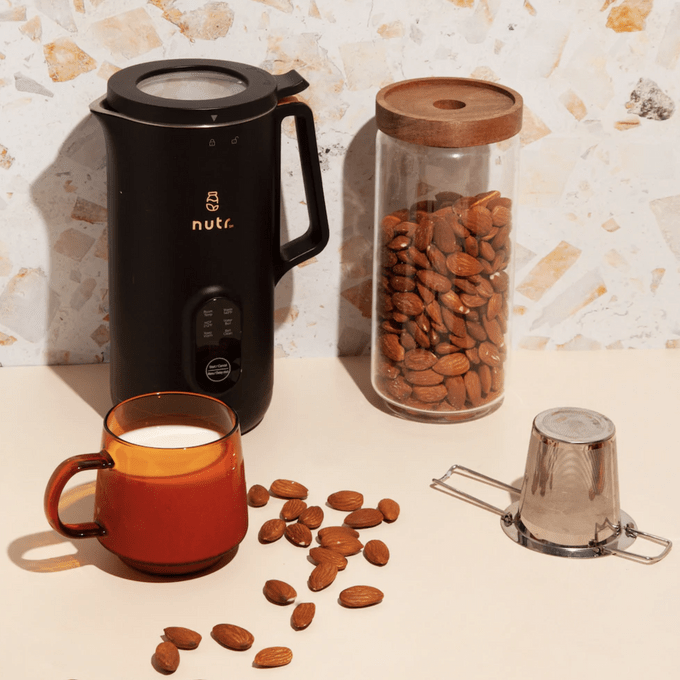
Nutr
Plant-based milks are a more eco-friendly alternative to dairy, which contributes to climate change through greenhouse gas emissions and high water use. But the stuff you buy in grocery stores can be expensive, and the packaging contributes to waste. Enter Nutr. Its sleek little machine makes nut, oat, rice and other nondairy milks in a matter of minutes. There are three steps: Add nuts, add water and choose your preferred temperature, and blend. (Nutr also carries reusable glasses, jars and other accessories to aid your milk-making.)
Pros:
- Nutr plants one tree for every machine sold
- Cuts down waste by making single portions
- Doesn’t take up much counter space
Con:
- Makes only one portion at a time, so not ideal for easily making multiple servings
Best for underwear
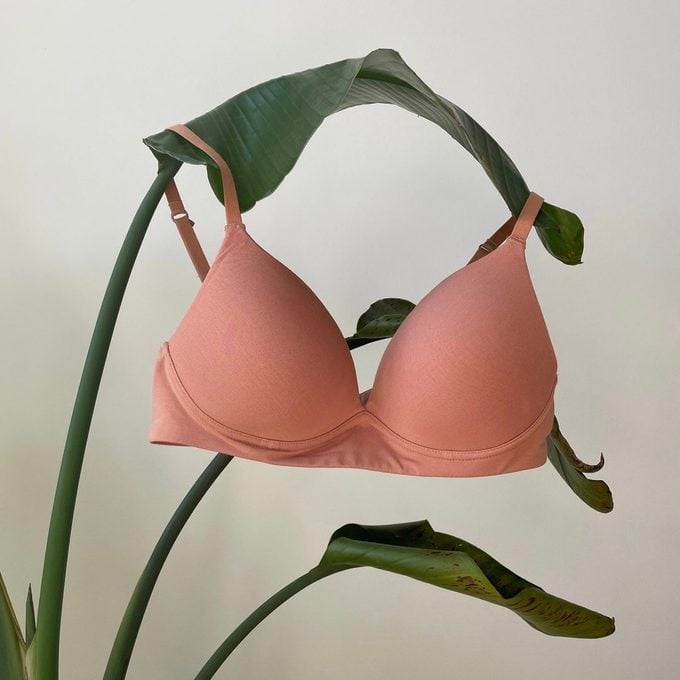
In Common
During the pandemic, seasoned fashion pro Allison Bloch struggled to find affordable basics that didn’t compromise quality, fit or ethics. So she started In Common. You have to love a company founded on the principles of better manufacturing processes, sustainable fabrics and fair-wage employment—all for a fair price. Aside from comfortable, modern designs, you’ll find sustainable fabrics, like recycled polyester threads, environmentally sustainable cotton and Tencel made through an environmentally responsible process. Even the packaging puts the planet first.
Pros:
- Made from sustainable materials
- Packaged in biodegradable and compostable bags and mailers
- Items for both men and women
Con:
- Fewer color options for men’s items
Best for sunglasses
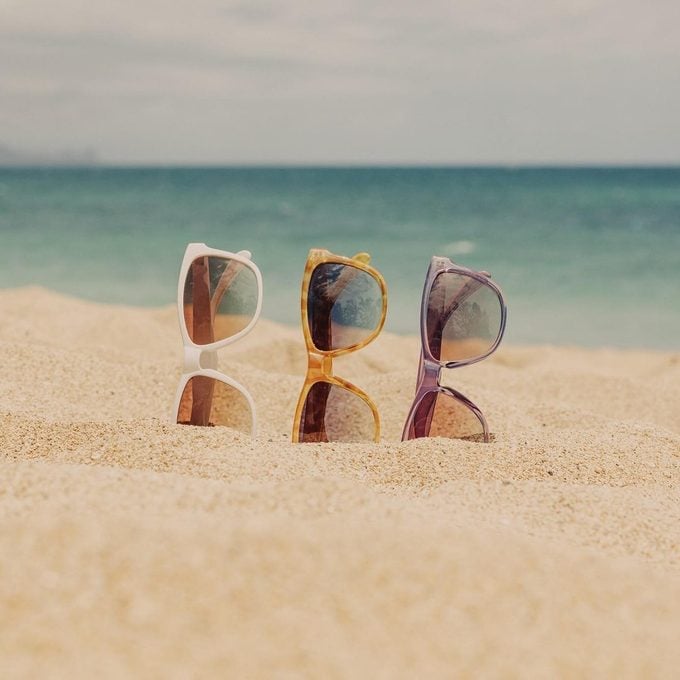
Sunski
You don’t have to be an adventurer or outdoor aficionado to appreciate Sunski sunglasses or blue light glasses. They’re made of recycled material, come in plastic-free packaging and are part of the 1% for the Planet initiative. Unlike cheap knockoff frames, which might fall apart quickly, these also pass the FDA basic impact test. Plus, they’re lightweight and super comfortable, and if you don’t love them, you can return them without a hassle.
Pros:
- Made of recycled materials
- Plastic-free packaging
- 1% for the Planet certified
- Climate neutral certified
- Lifetime warranty
Con:
- Sunski sells only sunglasses and blue light glasses, not traditional eyeglasses
Best for skin care
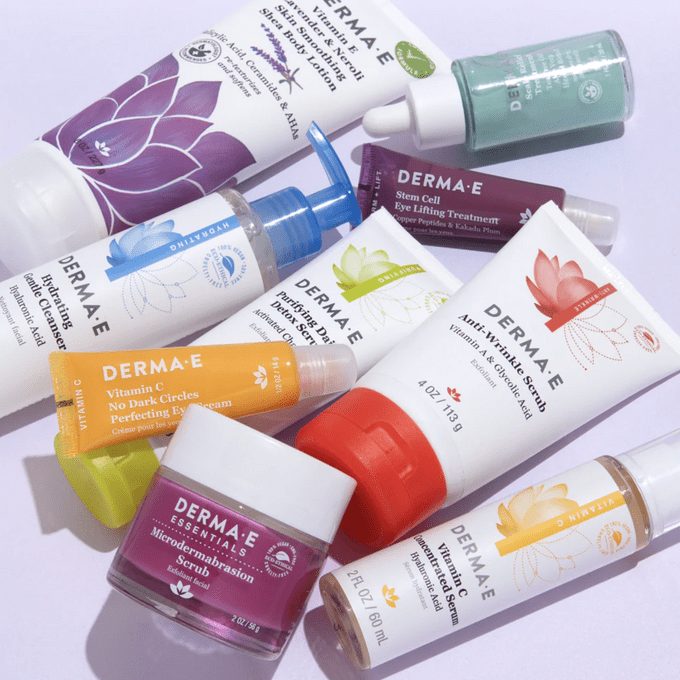
Derma E
Unlike beauty brands that are just now jumping on the sustainability bandwagon, Derma E has spent the past 35 years trying to find ways to lessen its impact on the environment. It’s a completely plastic-neutral brand (yes, you can live a life without plastic!) and features 100% recyclable packaging on all its natural skin-care products. And as a carbon-neutral company, Derma E offsets 100% of traditional electricity use with wind energy.
Pros:
- Plastic- and carbon-neutral brand
- Recyclable packaging
- No added fragrances or toxic ingredients
- Cruelty-free and vegan
Con:
- Expansive product line might be overwhelming to skin-care newbies (ask a dermatologist for help finding your ideal regimen)
Best for home goods
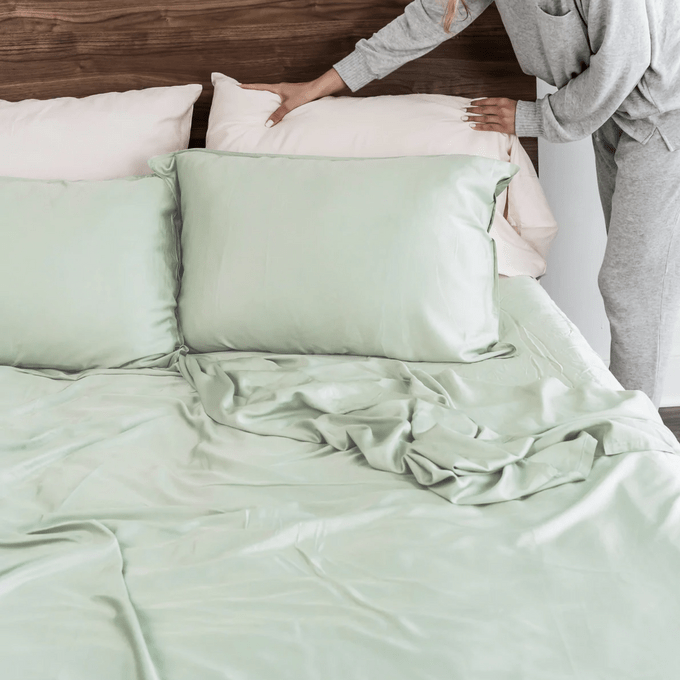
Made Trade
It’s hard not to love a brand that holds itself to a higher ethical standard and refers to itself as “ethically elevated.” There’s a reason Made Trade can get away with that description: The company is climate neutral, fair trade and uses only upcycled, recycled or sustainable materials. Its business model ensures small makers get the spotlight and customers get sustainable goods. The brand features more than 150 makers and artisan collectives, carefully reviewing their practices and labor conditions as well as their products.
Pros:
- Climate neutral certified
- Family-run and woman-owned small business
- Sustainability and ethics of each product clearly spelled out in the description
- You can shop by your values: BIPOC brands, vegan goods, products made in the United States and more
- Sale section good for stalking discounted items
Con:
- You won’t find extensive styling options for home or clothes on the site, so it’s easier to shop if you already have great style
Best for footwear
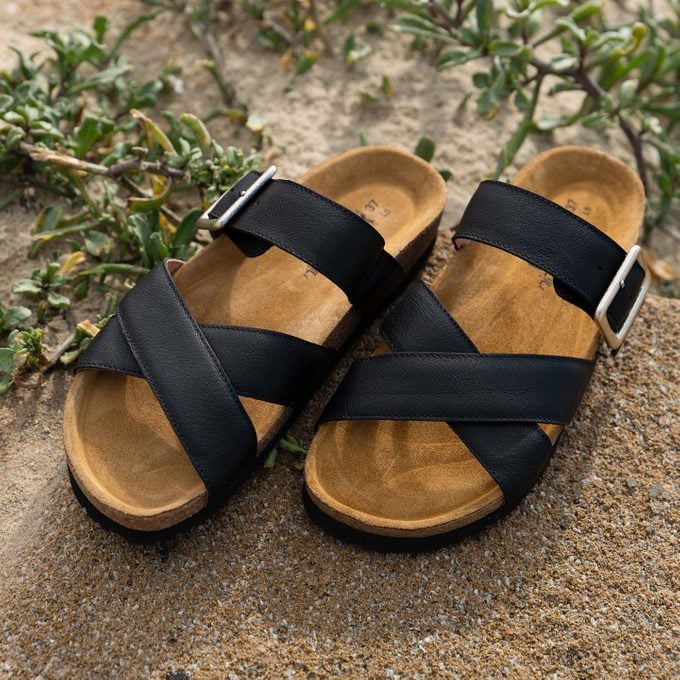
Naot
Naot has long been a favorite for ethically minded shoppers, and that’s thanks to what the company calls its “shoes of peace.” The Naot factory is located in a small farming community in the northernmost part of Israel, where it’s been handcrafting shoes since 1942. It employs people of every faith and ethnicity, and every pair of shoes is handmade through the joint craft of Israelis and Palestinians. As a socially active company, Naot donates thousands of pairs of shoes to battered women and homeless shelters throughout the United States and around the world every year.
Pros:
- Handcrafted through sustainable methods
- Features vegetable-tanned leather and a cork footbed to minimize the environmental impact
- Boxes made of recycled materials
- Ethical manufacturing
Con:
- Shoes are comfortable when standing on your feet or walking but may not be ideal for long walks
Best for backpacks
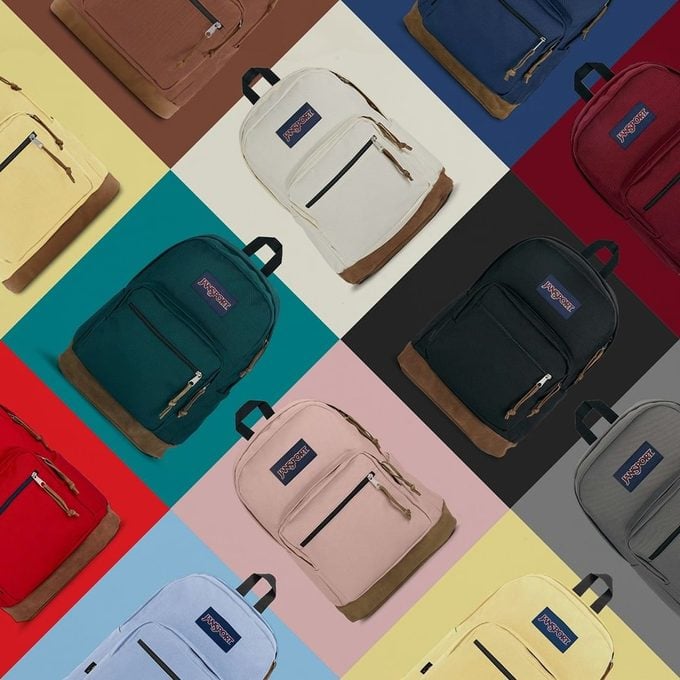
JanSport
You might remember JanSport as the student body’s go-to backpack brand the last time you were in school, but the company is worth paying attention to for another reason: It has a long-term commitment to sustainability. Believe it or not, more than 80% of the products are made with 100% recycled main body fabric. The packaging uses 100% recycled FSC-certified paper, which saves 1,338 trees annually. The efforts are making a difference: By switching to an undyed, 100% recycled lining, JanSport estimates it reduced its water consumption by 1 million gallons.
Pros:
- The Surplus collection is made entirely of factory surplus materials, addressing the issue of 85% of textile waste ending up in landfills
- Made from recycled fabric
- Renewable energy sources incorporated into the manufacturing process
- All products are PVC-free
- Warranty program helps reduce waste
Cons:
- The labels have gotten larger on some items, which may be a turnoff
- Prices can vary from incredibly affordably to slightly steep
Best for chocolate
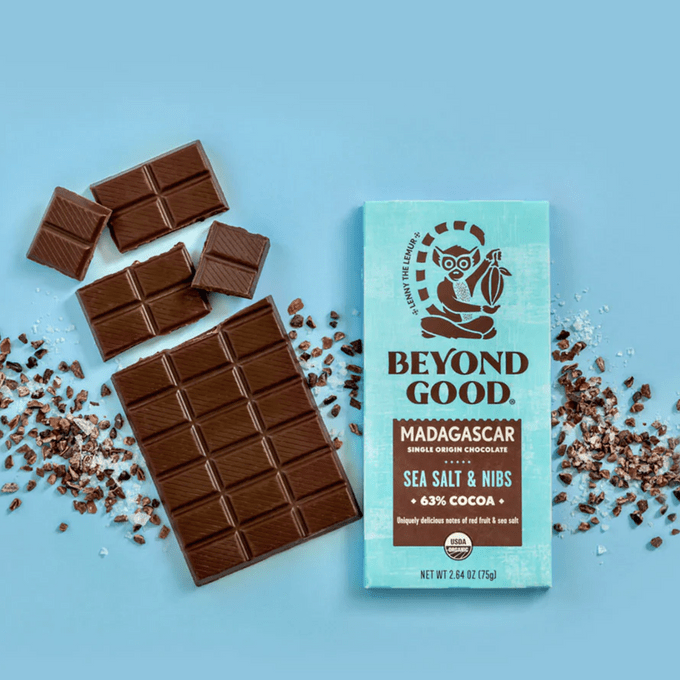
Beyond Good
While we can all agree that chocolate is delicious, doing a deeper dive into the way chocolate is manufactured might leave a bad taste in your mouth. Beyond Good is a sustainable food company that ethically and sustainably produces chocolate in Africa. It works directly with cocoa farmers, allowing them to earn more money. Also notable: These farmers don’t have to resort to chopping down trees to plant more cocoa. Instead, they convert rice lands into shaded areas where cocoa pods sprout alongside banana, jackfruit and citrus trees.
Pros:
- Helps save endangered animals through reforestation
- Practices sustainable agroforestry
- Wide variety of pure dark chocolate and flavored dark chocolate
Con:
- This is serious chocolate and may taste a bit too full-bodied for those who prefer milk chocolate with lots of preservatives
Best for oral care
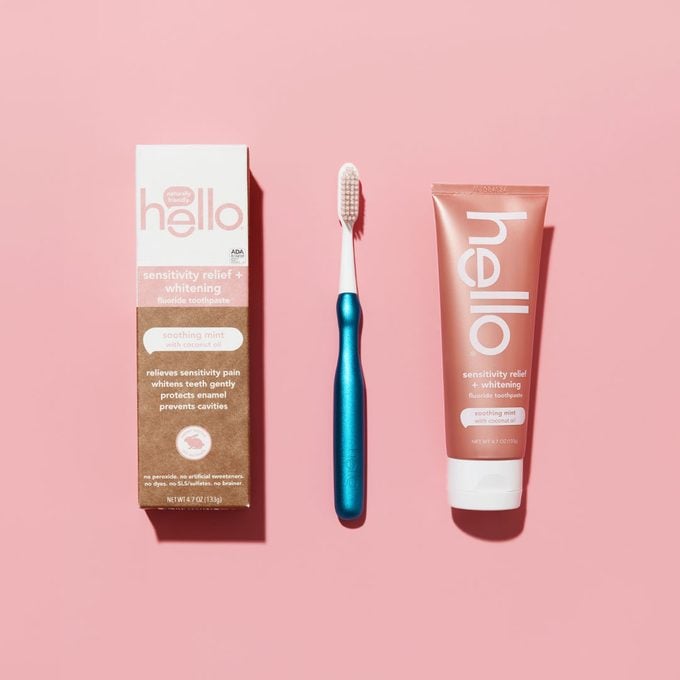
Hello
One thing Hello does really well is make you feel happy while using its goods. And how meta is it that a tube of toothpaste meant to improve your smile can actually make you smile? Take, for instance, the Unicorn Sparkle Fluoride Toothpaste, which looks like fun in a tube. Even better, it’s free of dyes, artificial flavors or colors, parabens, mint and preservatives. All Hello products are cruelty-free, and the company focuses on sustainability in the products it sells—like toothpaste tablets that do away with plastic tubes—and a partnership with Terracycle that makes recycling your empties easier.
Pros:
- Uses sustainably sourced ingredients
- Packaging uses recycled paper and soy-based ink
- Recycling program with Terracycle
Con:
- Unless you buy the tablets, you’ll still have plastic waste from the toothpaste tubes
Best for clothing
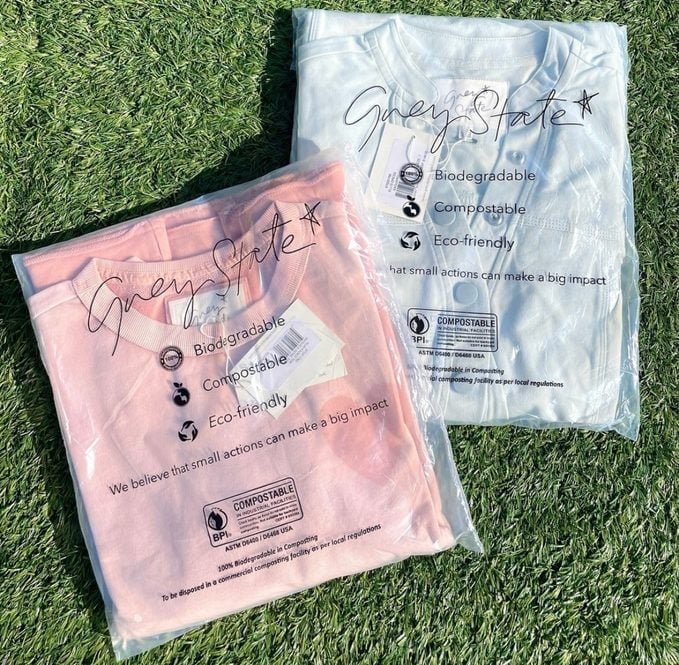
Grey State
If you’re trying to quit fast fashion, you might want to start by choosing a few investment pieces you can wear all summer and then layer as the seasons change. Grey State keeps the environment front of mind, showing its support for green initiatives by manufacturing goods in a LEED-certified building powered by solar energy, avoiding planet-harming dyes, harvesting rainwater, using upcycled textile waste and more. Plus, it works to create jobs locally and pay fair wages. It’s also a woman-owned brand that strictly adheres to the United Nations’ Sustainable Development Goals, a set of 17 goals designed to ease world problems like poverty, gender inequality and climate change. The clothes are made to last, but when you’re ready to move on from an item, do the environmentally responsible thing and either recycle or upcycle the clothes.
Pros:
- Manufacturing plant focused on reducing energy and water consumption
- Donates a dollar from each sale to One Tree Planted
- Through UPS Carbon Neutral, it works to offset the environmental impact of shipping
Cons:
- Limited options for plus sizes
- Muted, neutral palette may not appeal to everyone
More places to find sustainable goods
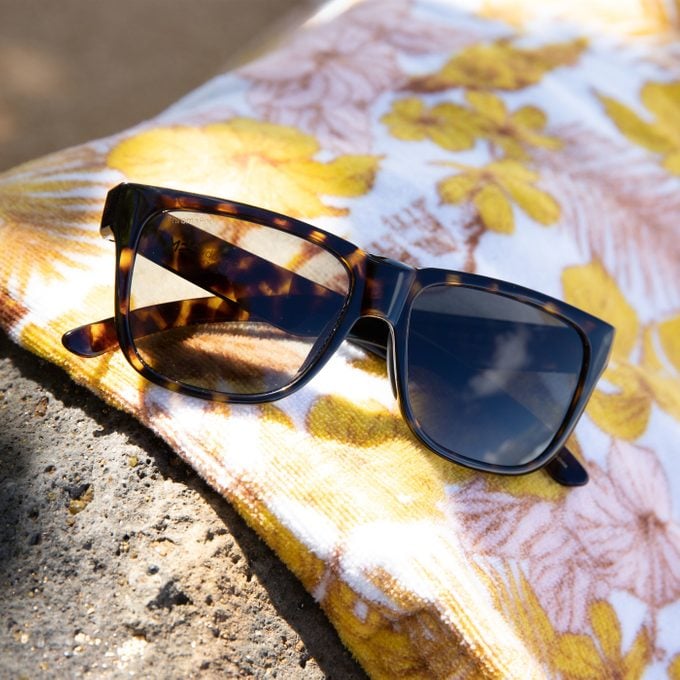
These companies might not be among the top eco-friendly brands, but they offer product lines that keep sustainability in mind.
Smith sunglasses
If you live in a sunny climate, you probably wear sunglasses year-round. Smith has revamped the way its stunning glasses are made, and three frame styles in particular—the Lowdown, Eastbank and Shoutout—are made of five post-consumer recycled plastic water bottles and use Evolve (derived from non-GMO castor plants) polarized bio-based lenses. They also come with a microfiber bag made from recycled plastic bottles and ship in 100% recycled packaging. Even if you don’t buy from the eco-friendly line, your sunglasses will come in a recycled box.
Pros:
- Three frames made from sustainable materials
- 100% recycled packaging
- Reasonably priced
- Wide selection of frames in a variety of styles
Cons:
- Though almost all frames are prescription-friendly, some of the lenses are so specialized you won’t be able to match the look with prescription lenses
- The rest of the frames aren’t sustainably created
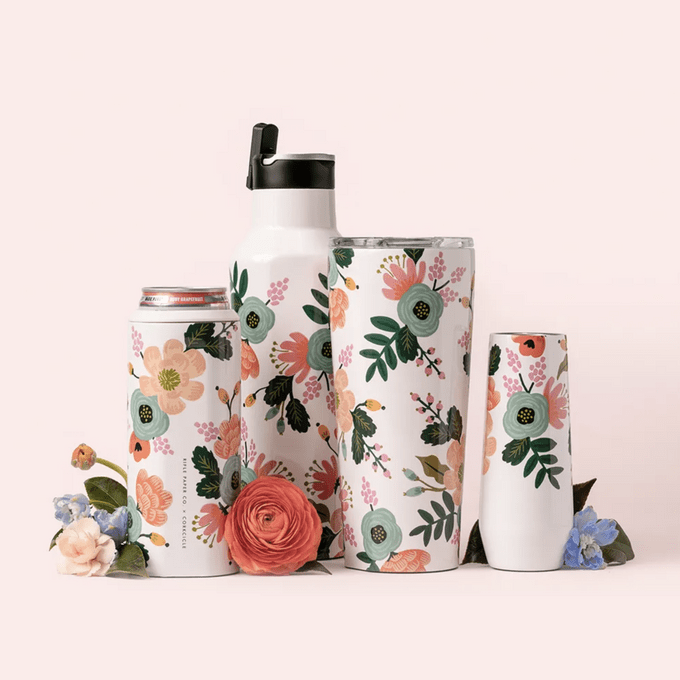
Rifle Paper Co. x Corkcicle insulated drinkware
After working on a story about reusable water bottles, I became obsessed with finding the perfect product. Sadly, at the time I didn’t know that Rifle Paper Co. had teamed up with Corkcicle to create the most gorgeous bottles and glasses around. Not only will Rifle Paper Co.’s iconic designs elevate your morning coffee or water, but they’ll convince you to ditch the plastic water bottles and single-use coffee cups that end up in landfills. Reusable drinkware is the smarter, more sustainable and prettiest option.
Pros:
- Attractive designs offer an incentive to switch to reusable drinkware
- Corkcicle donates a portion of each sale to help give clean water to those in need
- Corkcicle has committed to eliminating single-use plastic in its packaging
Cons:
- Pricey
- Little additional information about the companies’ sustainability practices
Vionic shoes
Vionic shoes are already well known for being designed with comfort in mind. Extra arch support, major cushioning and extra stability—this footwear has it all. But did you also know Vionic has a line of eco-friendly and leather-free choices? The Vionic x Proteus collection, created in collaboration with underwater research station Proteus, features shoes made from 100% recycled ocean-bound plastic bottles. Since the collection launched, more than 70,000 plastic bottles have been diverted from landfills. That means that in addition to being cute, these shoes are helping our planet stay healthy.
Pros:
- Vionic x Proteus line created from recycled plastic bottles
- A number of Vionic shoes have the American Podiatric Medical Association seal of acceptance
- Wide range of styles
- Reasonably priced
Cons:
- The shoes may need some breaking in
- The flatform styles can make even the most secure walker feel a bit wobbly at times
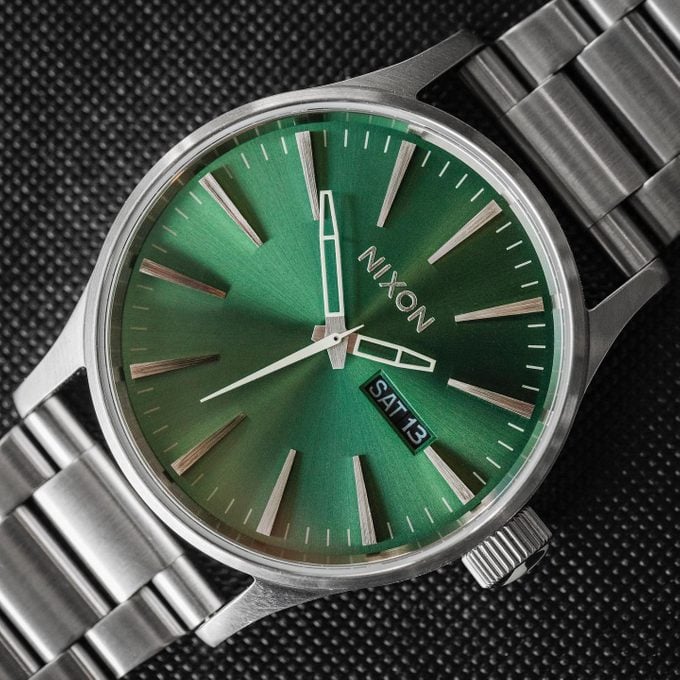
Nixon watches
Here’s a good reason to start wearing a wristwatch again: Nixon makes watches (and bags!) from reclaimed ocean plastics. In fact, Nixon’s Light-Wave is the first solar analog watch that uses Tide brand ocean plastics.
Pros:
- Collaboration with Tide turns ocean plastics into materials used in watches
- Wide range of styles
- Personalized engraving optional for some styles
Cons:
- Bands may be too tight for those with larger-than-average wrists
- Not all watches are sustainably made
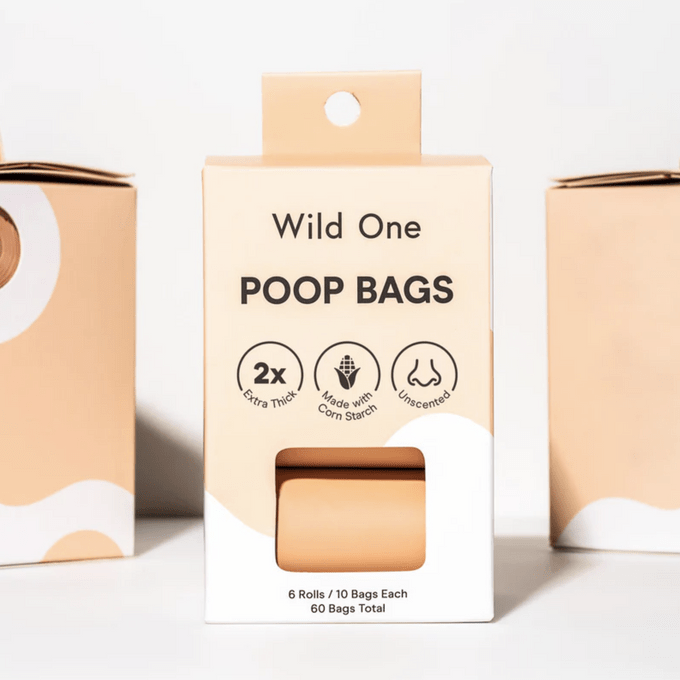
Wild One dog poop bags
You need to clean up after your dog—those are the rules of potty time!—but it can be disheartening to use so many plastic baggies. Enter Wild One. The company’s poop bags are made with cornstarch instead of plastic. They’re also unscented and leak-proof.
Pros:
- You don’t have to waste plastic while being a good citizen and cleaning up after your dog
- Reasonably priced
Cons:
- They’re imported, but the package doesn’t say from where
- Lack of information on the eco-friendliness of the brand’s other products
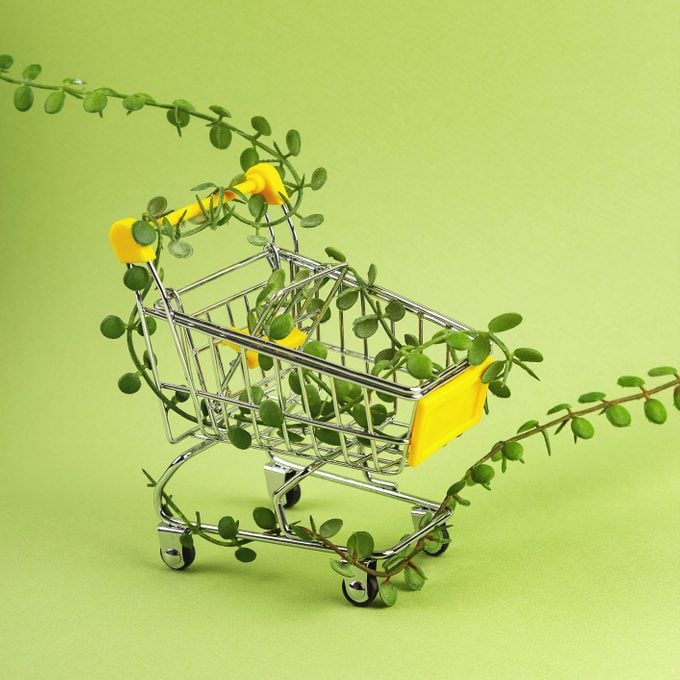
Sustainable shopping
You don’t have to attend a sustainable brands conference to know that some companies waste natural resources while others take steps to be more friendly to the environment. But don’t judge all brands harshly if they haven’t yet achieved full green status.
“There is definitely a spectrum when it comes to a company being eco-friendly,” said Blake Lawrence, marketing manager of Cool Effect, a nonprofit dedicated to reducing carbon emissions around the world. “It could mean a company is taking small steps to be more sustainable—like using recyclable packaging to ship product or purchasing high-quality carbon offsets to compensate for emissions from shipping—or it could be a larger scale, that they are aiming to achieve carbon neutrality.”
Once you’re done shopping these sustainable brands, find out more about living a sustainable life, including learning how to recycle, investing in a good recycling bin and selling your unwanted stuff instead of tossing it in the trash.
Sources:
- Craig Dubitsky, founder of Hello Products
- Steven Sashen, CEO of Xero Shoes
- Matt Bertulli, CEO of Pela
- Lizzie Horvitz, founder and CEO of Finch
- Blake Lawrence, marketing manager of Cool Effect

